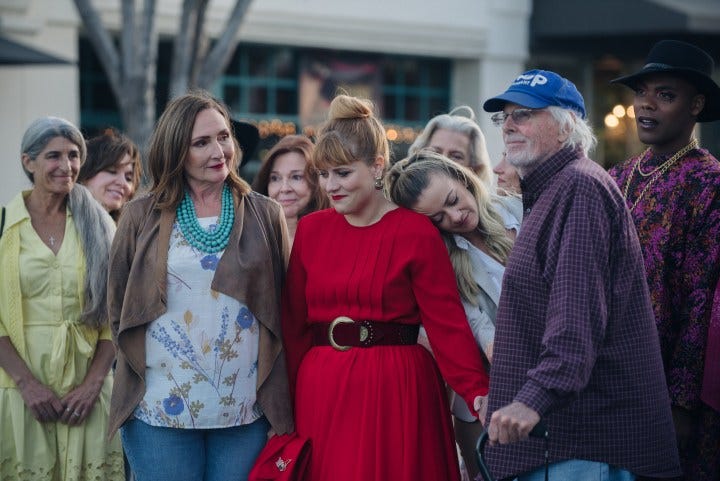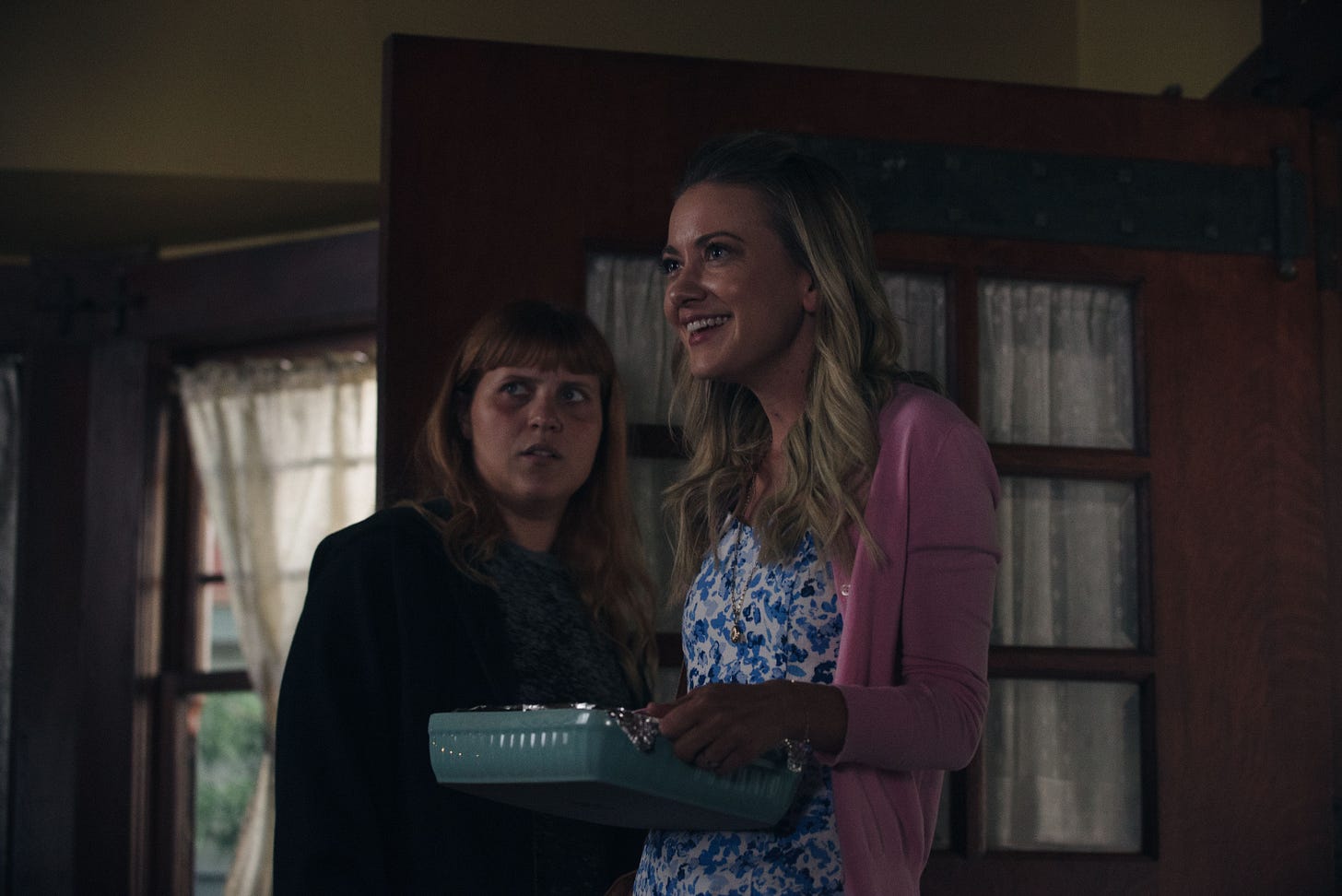I gotta give Joey Ally credit not only for starring in “The Hater”, a coming-of-age movie, but directing and co-writing it too. You really don’t see that very often. Usually, young filmmakers are interested in bigger issues because the world is so big to them, with so much of it not yet discovered. But Ally’s done a solid job with “The Hater”, a meandering, engaging political comedy that lands a couple of punches, even if it misses another handful.
Ally plays Dorothy, a liberal activist who lands in the hoosegow one night during a protest. Losing her job as a speechwriter for a senator, she returns home to Texas, and to her beloved grandfather played by Bruce Dern. This is a broad portrayal of Trump-era conservative policies, but Trump-era conservative policies are pretty broad, no? Dern is playing a MAGA guy, but he finds the nuance in the characterization, and he combines that crusty wisdom with a counterintuitive tenderness, even as he’s at odds with the film’s general point of view. This is also one of the few Hollywood movies to acknowledge that Fox News viewers generally leave the channel on all day to soundtrack their lives. There were a few televisions in my last institution that stayed on that channel for days and days.
What Dorothy plans as a way of rebounding is a hilariously overcomplicated scheme that is perfectly in line with modern Democrat orthodoxy. Her childhood nemesis Brent (Ian Harding), a spoiled pretty boy who has been groomed for a career in politics, is running as a Republican representative. To foil him, she opts to run against him also as a Republican, so that when he is defeated, she can drop out and allow the Democrat seeking the seat to run unopposed. Nevermind the fact she isn’t even really a resident of the area, and nevermind that she’d have to essentially cosplay as a conservative.
A series of farcical events follow, some amusing in a mildly pleasant way. She ends up foiling a robbery at a convenience store, which boosts her profile considerably. It forces her to take a 2nd Amendment stance, and she begins winning approval as a somewhat left-leaning conservative, even if she’s being disingenuous (but in her eyes, not dishonest) about her stances. She finds another high school acquaintance played by Meredith Hagner, who thinks Dorothy is a conservative she can support even though Dorothy looks down on her, a relationship with considerable tension you know is coming to a head. The film stays focused on Ally, who gives a performance both very funny and believably grounded as someone who keeps falling deeper and deeper into a lie they don’t even consider a deception. Who is this Joey Ally? Please put her in everything.
The movie’s wedge issue ends up being abortion. There’s a complex resolution to this particular plot device, one that suggests that there is a middle ground on an issue that was comfortably settled fifty years ago only to be undone by right-wing zealots who hope to erase decades of social progress for the sake of control. The movie, of course, was released before that decision, but it immediately hasn’t aged well. Then again, the end of Roe V. Wade was a distant nightmare scenario to a lot of us, so it’s not as if you can knock Ally for naivete.
“The Hater” has a happy ending that reveals that everyone previously depicted as a joke or a weirdo actually has additional layers. Decisions like the Supreme Court betrayal of Roe V. Wade (pushed by judges who, during their confirmation processes, had vowed to not challenge Roe V. Wade) reveal the opposite. It’s something you have to learn about in prison as well. Some guys are interesting, unique, and capable of complexities. You learn a lot about guys when you shop with them, eat with them, sleep across from them, use the same showers, sometimes for years on end. Some people are exactly what the packaging on the side of the bottle says they are. Some people in prison reveal themselves as just That One Thing. And it didn’t necessarily have anything to do with education. Some of these men had college degrees, successful businesses, maybe a family. And yet they still have anger and disgust at a world they believes reject them. And some people haven’t had the opportunities usually afforded to those with a middle class upbringing. Many still have an intellectual curiosity, a desire to learn and achieve more. And some lack that spark, that interest. Some are the exact same person, day and night. Have been, are, will be.
And so you live within a population of men. A population of men who may have masters’ degrees but will hang their wet socks over your bed. A population of men who have suffered and who can only process this through the suffering of others. A population of men that require, perhaps, psychiatric help, which the F.B.O.P. doesn’t provide. I don’t have an answer to this solution. The F.B.O.P. doesn’t either. But they are the ones calling their institutions “correctional centers.”
A word about something personal… in 2018, I took an actual beating in prison, I’ve discussed it here before. The institution took me to receive x-rays, when they learned I had a bilateral jaw fracture. They broke my face in half. Such a condition legally requires treatment within 48-72 hours, otherwise the jaw will heal back incorrectly. The prison kept me in the SHU, and held onto me for seventeen extra days. When it was time for surgery, my jaw had to be broken once more before it could be fixed. (I will end any suspense by telling you the somewhat-risky surgery was successful, and I am supermodel-gorgeous today).
I sued. This was under a Bivens’ claim, based in a case called Bivens v. Six Unknown Named Agents, circa 1971. A Bivens’ action typically emerges from a situation where a federal official violates your Constitutional Rights. Typically in prison situations, the right is tied into the 8th Amendment, which prevents “cruel and unusual punishment”, like, say, being placed in the SHU and having to suck blended prison food out of a straw because no one wants to provide surgery for your shattered face. I had a solid case, the eyewitness accounts and the evidence plainly stated a long history of neglect and disinterest during that period where I required medical attention. No facts were disputed during depositions.
The case is likely no more. I am pursuing an appeal, though that is likely a superficial gesture. Years ago, the Supreme Court engaged in a ruling that ensured a new reading of a Bivens’ claim was necessary, one closer to the original case. Bivens’ initially was regarding the Fourth Amendment, and so if a case does not leave a victim in a near-fatal condition, or if it doesn’t closely mirror the original Bivens’ decision, it will be tossed out. This was the reasoning when my case was originally dismissed by a judge.
Shortly after that, however, as I was preparing my appeal, a very similar case arose from a man who went to the same prison as me at the same time, our paths may have crossed. I will not discuss the specifics of his case, but it is far worse than mine, illustrating a concerted effort by the staff to harass and harm him, followed by a most-egregious harm beyond what I survived. Like me, he was pursuing his case in the Third Circuit (generally a circuit highly populated with incarcerated individuals in New Jersey, Pennsylvania and Delaware). And his case was summarily dismissed. Because he didn’t die.
This is what it has come to. A more “originalist” Supreme Court has determined there can be no remedy for an incarcerated individual if that person is abused and mistreated by staff, as long the mistreatment did not lead to a near-fatal condition. If they don’t kill you, then anything else they do to you is protected — the courts deferred to the institution in these newer cases, basically saying they should discipline themselves.
And how is that going, you might ask? Given the current climate for the Bureau of Prisons, there has been an approach led by the courts to lessen the burden on these correctional facilities. Apparently their “struggle” is real, and thus they have earned the benefit of the doubt given the oversight pursued in the wake of several scandals. In the court’s eyes, an officer can beat and wallop on you for no reasons, and the expectation is that the prison will punish that officer. The best-case-scenario relief, in reality, will be that the officer is moved away from the inmate, possibly sent to another institution, for “disciplinary” reasons. Give these prisons a break, they can barely police themselves!
The Supreme Court has ruled that, if inmates are abused by staff, there is no remedy. They have thus given a green light to every officer and guard with a grudge, every mismanaged thug with a nightstick in these institutions, to abuse their authority in battering their captives, particularly if it is for the sake of the institution’s “penological goals.” I will lose my appeal. And the next inmate in line will see his freedoms crushed, while the courts purposely turn their heads. This is what they tell you justice is.








I know this may not mean much but I’m so sorry man. And I hope you win your appeal.